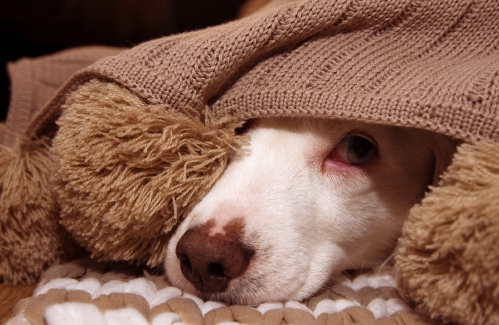- September 27, 2022
- No Comment
- 6 minutes read
Granite Geek: Mystery dog illness in N.H. shows how bad we are at spotting disease outbreaks – Concord Monitor

An unusual plea for veterinary clinics to donate money to a state laboratory so it can diagnose a mysterious syndrome hurting New Hampshire’s dogs is another reminder that we aren’t doing enough to spot emerging diseases – as if a reminder was needed after COVID.
The plea was sent out earlier this month to members of the New Hampshire Veterinary Medical Association from David Needle, a senior veterinary pathologist at the New Hampshire Veterinary Diagnostic Laboratory. It asked veterinarians to donate a small amount of money to a state program to perform more genetic tests and try to pin down a puzzling outbreak of respiratory problems in dogs.
The outbreak, which seems to have affected hundreds of dogs in parts of New Hampshire with serious, long-lasting coughs and breathing problems, is classified as a syndrome at the moment – a collection of symptoms with no known cause. “It might not even be just one disease,” Needle said Monday.
Tests on affected dogs have shown that the symptoms are not due to pathogens that cause kennel cough or pneumonia, so the next step is to start broader testing of many samples from affected animals to find what they have in common. But that takes staffing and lab supplies and time that haven’t been budgeted for.
“(This) has highlighted a lack of resources for investigational diagnostics. Similar incidents of unidentified animal disease occur on a regular basis, so developing a N.H. Veterinary Investigational Diagnostics Fund could return big dividends,” Needle wrote in his pitch.
Needle said that a few thousand dollars of donations have come in, enough to perform a number of the tests and, with existing funds, perhaps get a small pilot project going. The tests cost roughly $200 per sample once “preparation, extraction, sequencing, and bioinformatics analysis for pathogen detection” is factored in, Needle wrote. “At present, we have a small amount of money to test a few samples for this morbidity event, but to complete this diagnostic investigation, more funds are required.”
Money will also be needed to pay for autopsies on dead dogs to help pin down the matter.
Needle said he has been worried for some time about how a shortage of medical surveillance leaves us vulnerable in a rapidly changing world. The problem isn’t merely that we need early notice of new viral or bacterial diseases such as COVID-19. We also need to be alerted to the movement of existing diseases into places they aren’t expected.
Needle pointed to the fact that gastropods such as snails can carry the bacteria which causes listeria, which can sicken animals and people. Climate change is allowing many new species to thrive in New Hampshire and it’s possible that invasive gastropods are the reason New Hampshire biologists are seeing listeria in wild animals such as foxes for the first time.
But dealing with increasing changes in public health issues will take more than a few extra staffers in existing laboratories, Needle said. A change in approach is necessary.
“That’s the idea of One Health,” he said. This is the name of a loose program, cited by the CDC as well as global health programs, that recognizes the interconnection of the health of people, domestic and wild animals, plants and ecosystems and uses it to shape disease control.
It’s mostly a good idea rather than a policy at the moment, but perhaps the continuing drumbeat of unexpected diseases will force us to wake up.
A small example of a change in thinking is wastewater surveillance, in which sewage is tested to spot disease outbreaks. That technology has been available for a while but nobody wanted to pay for it until COVID-19 came along; now there’s a discussion about making it a regular part of public health monitoring.
Any attempt to increase medical surveillance, whether for people, animals, plants or anything else, will be a tough sell in do-as-little-as-possible New Hampshire, where a love of tax cuts and “efficiency” has created a culture of being penny-wise and pound-foolish. It’s the sort of intelligent action that requires government action, since private businesses will never do something with so little return on investment, and a distressing number of our lawmakers oppose the idea of government doing much of anything, hoping volunteers will somehow fill the bill.
Speaking of volunteers, there’s no formal pitch for public funding but if you’re psyched about this cause, you can mail a check to the New Hampshire Veterinary Medical Association, with “Investigational Diagnostics Fund” in the memo field. Address is NHVMA,PO Box 247 Amherst, NH 03031.
David Brooks is a reporter and the writer of the sci/tech column Granite Geek and blog granitegeek.org, as well as moderator of Science Cafe Concord events. After obtaining a bachelor’s degree in mathematics he became a newspaperman, working in Virginia and Tennessee before spending 28 years at the Nashua Telegraph . He joined the Monitor in 2015.
The General Federation of Women’s Clubs NH (GFWC NH) recently presented the 2021 and 2022 Unity Award winners with a plaque as a small token of…
Old Home Day success With another (very) successful Old Home Day behind us, the Boscawen Old Home Day (BOHD) Committee is extremely grateful for…
Concord Cait McAllister was named to the dean’s list for the spring semester at the University of New Hampshire.Jackson LaSalle was named to the…
Meredith Communitydiscussion “All Eyes on NH: Political Coverage in the Granite State,” is on Sept. 27 from 5:30 to 7:30 p.m. at the Twin Mountain…

